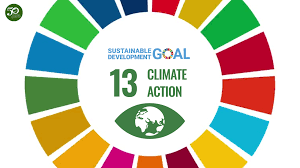The Importance of Climate Action in Achieving the Sustainable Development Goals (SDGs)
Climate action is a critical component of the global efforts to achieve the Sustainable Development Goals (SDGs) set by the United Nations. The SDGs provide a framework for addressing various social, economic, and environmental challenges facing our world today, with climate action being one of the most urgent priorities.
Why is Climate Action Important?
The impacts of climate change are already being felt around the world, from extreme weather events to rising sea levels and loss of biodiversity. Without immediate and decisive action to reduce greenhouse gas emissions and mitigate the effects of climate change, these impacts will only worsen, threatening human health, livelihoods, and ecosystems.
How Climate Action Supports the SDGs
Climate action is closely linked to several other SDGs, including goals related to poverty eradication, sustainable cities and communities, clean energy access, and biodiversity conservation. By taking bold steps to reduce carbon emissions, transition to renewable energy sources, and build resilience to climate impacts, countries can make progress towards achieving multiple SDGs simultaneously.
The Role of Individuals and Communities
While governments play a crucial role in setting policies and targets for climate action, individuals and communities also have a part to play. By making sustainable choices in our daily lives – such as reducing energy consumption, using public transportation, supporting renewable energy initiatives, and advocating for climate-friendly policies – we can contribute to global efforts to combat climate change.
Conclusion
Climate action is not just a standalone goal but a cross-cutting issue that underpins many aspects of sustainable development. By prioritizing climate action and integrating it into broader development strategies, we can create a more resilient and equitable future for all. Let us work together towards a world where people and planet thrive in harmony.
5 Essential Tips for Taking Climate Action and Supporting Sustainable Development Goals
- Reduce energy consumption by using energy-efficient appliances and turning off lights when not in use.
- Minimize waste by recycling, composting, and opting for reusable products instead of single-use items.
- Support sustainable transportation options like walking, biking, carpooling, or using public transit.
- Plant trees and support reforestation efforts to help absorb carbon dioxide from the atmosphere.
- Advocate for policies that promote renewable energy sources and reduce greenhouse gas emissions.
Reduce energy consumption by using energy-efficient appliances and turning off lights when not in use.
Reducing energy consumption is a simple yet impactful way to contribute to climate action and progress towards the Sustainable Development Goals. By using energy-efficient appliances and making a habit of turning off lights when not in use, individuals can significantly decrease their carbon footprint and help conserve resources. These small actions not only lead to cost savings but also play a vital role in promoting sustainable practices that benefit both the environment and future generations.
Minimize waste by recycling, composting, and opting for reusable products instead of single-use items.
Minimizing waste through practices such as recycling, composting, and choosing reusable products over single-use items is a crucial step in taking climate action and supporting the Sustainable Development Goals (SDGs). By reducing the amount of waste we generate and properly managing our resources, we can lower greenhouse gas emissions, conserve energy, and protect natural ecosystems. Embracing sustainable habits not only helps mitigate the impacts of climate change but also promotes a more circular economy that values resource efficiency and environmental stewardship.
Support sustainable transportation options like walking, biking, carpooling, or using public transit.
Supporting sustainable transportation options such as walking, biking, carpooling, or using public transit is a practical and effective way to take climate action and contribute to the Sustainable Development Goals. By choosing eco-friendly modes of transportation, individuals can reduce carbon emissions, alleviate traffic congestion, and promote healthier lifestyles. Embracing these sustainable alternatives not only benefits the environment but also enhances community well-being and fosters a more sustainable future for all.
Plant trees and support reforestation efforts to help absorb carbon dioxide from the atmosphere.
Planting trees and supporting reforestation efforts is a powerful way to take climate action and contribute to achieving the Sustainable Development Goals. Trees play a crucial role in absorbing carbon dioxide from the atmosphere, helping to mitigate climate change and combat its effects. By investing in tree planting initiatives and supporting reforestation projects, we can actively participate in reducing greenhouse gas emissions and promoting a healthier environment for current and future generations.
Advocate for policies that promote renewable energy sources and reduce greenhouse gas emissions.
Advocating for policies that promote renewable energy sources and reduce greenhouse gas emissions is crucial in the fight against climate change. By supporting initiatives that prioritize clean and sustainable energy sources, we can significantly lower our carbon footprint and mitigate the impacts of global warming. These policies not only contribute to achieving the Sustainable Development Goals but also pave the way for a more sustainable and environmentally friendly future for generations to come.

